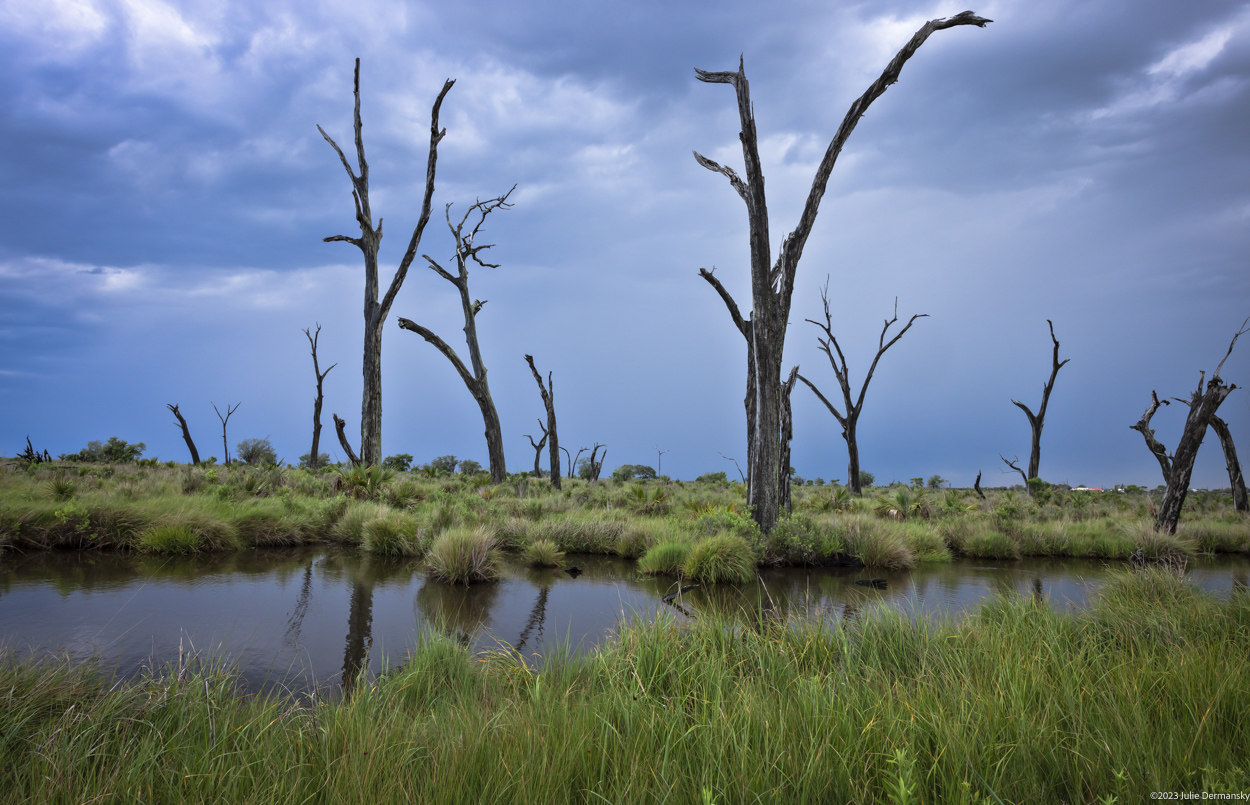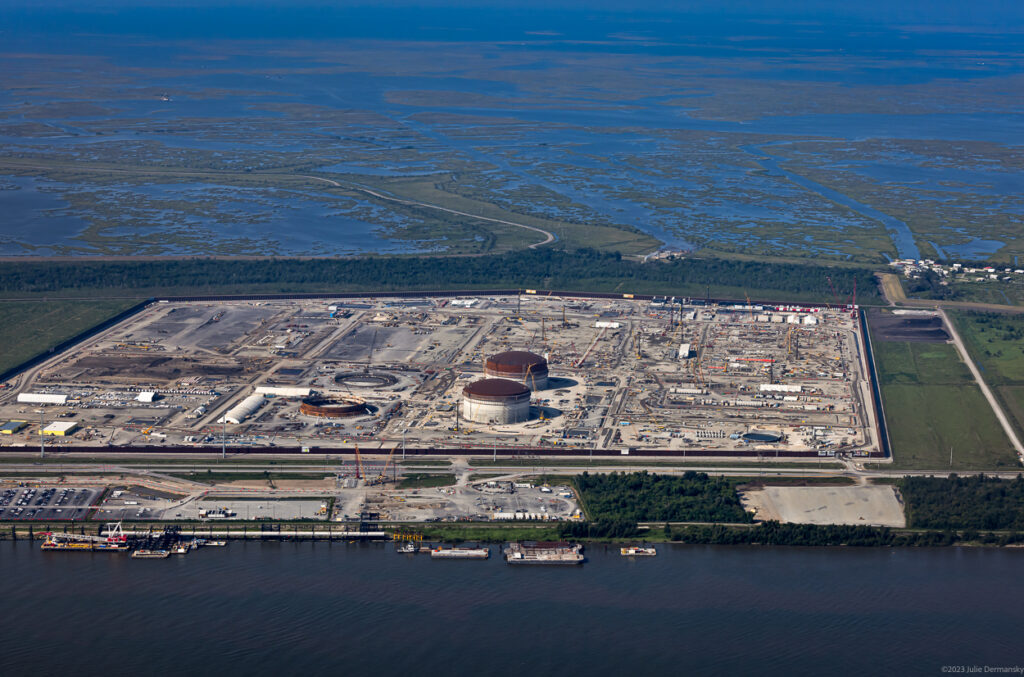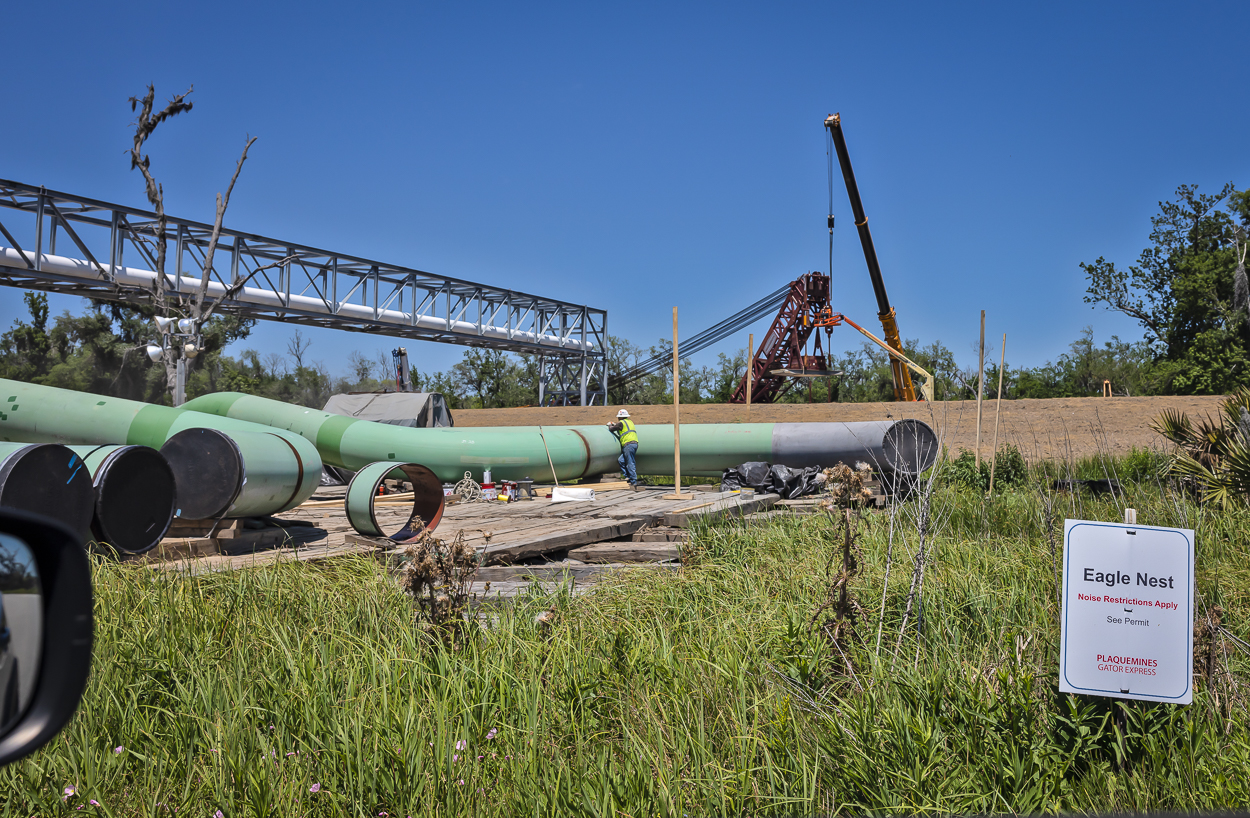U.S. fossil fuel firms are pushing to build more than 2,900 miles of natural gas pipelines to feed liquefied natural gas (LNG) export facilities in Louisiana, Texas, and Alaska, in a bid to send more of the fuel to Asia and Europe, a new analysis by Global Energy Monitor shows.
The pipeline projects would transport fracked natural gas from drilling sites to compressor stations and onto LNG export terminals where the fuel would be supercooled and loaded into tankers. The proposed build-out also includes 20 new LNG export terminals.
But as coastal communities and tribes watch the infrastructure build up around them, many worry about the impact it may have on their safety, livelihoods, and culture. Others wonder why billions of dollars are being sunk into economically and environmentally risky projects that appear redundant.
“Enough is enough. We don’t need any more of these here,” said Cindy Robertson, who lives in Sulphur, Louisiana, about two miles from a proposed natural gas pipeline. “We don’t need any addition to the burden we’re already feeling.” Sulphur lies close to existing fossil fuel infrastructure, including two LNG export facilities, and chemical manufacturing plants. It is also near the coast, making it vulnerable to damage from hurricanes.
“Fossils of the Fossil Fuel Industry”
In an analysis for DeSmog, Global Energy Monitor identified 32 natural gas pipelines that have been proposed, are under construction, have been shelved, or are idle and intended for future use. The San Francisco-based nonprofit collects information about fossil fuel and renewable energy projects using government reports, news articles, and regulatory permits.
Fossil fuel firms are exporting record-breaking amounts of natural gas from the United States with no sign of slowing down. Global Energy Monitor data show that the would-be pipelines could carry as much as 17,304 billion cubic feet of natural gas annually — about half the amount of natural gas the U.S. consumed last year — although not every pipeline would add capacity because some are interconnected.
The pipelines would cost billions of dollars to build. The combined cost of 13 of them — those with cost data available — is more than $62 billion. Some of the pipelines may not be built, but the Federal Energy and Regulatory Commission (FERC) has already approved more than 1,200 miles of pipeline, including the Alaska Nikiski LNG Project, an 800-mile pipeline that bisects Alaska.
High rates of return on federally permitted natural gas pipelines allow companies to charge their customers more and incentivize overbuilding pipelines, said Megan Gibson, chief counsel for the Niskanen Center, who is representing Louisiana landowners against the 90-mile CP Express pipeline. “There’s a perverse incentive structure in place for companies to continue building projects that we don’t need,” she said.
In 2021, S&P Global projected that demand from LNG export terminals would drive much of U.S. natural gas pipeline construction through 2026. But the International Energy Agency projects that under a net-zero emissions scenario natural gas demand begins to shrink by 2030.
Pipelines built today could cease to be useful within the next decade, said Baird Langenbrunner, a research analyst at Global Energy Monitor. “They’ll be fossils of the fossil fuel industry,” he said. “All of this money sunk into it is kind of lost.”
Pipelines Threaten Sacred Land
Twenty-six of the proposed pipelines, totalling more than 2,000 miles, would feed natural gas to LNG terminals on the Gulf Coast through Texas and Louisiana. Tribes there worry that pieces of their history could be destroyed by the projects.
Virginia-based Venture Global is behind about 400 miles of planned pipelines in Louisiana. In 2019, the company announced its intention to build the 280-mile Delta Express pipeline from northern Louisiana to an LNG export terminal under construction in Plaquemines Parish — Louisiana’s southernmost parish. If built, the pipeline would cut through 14 parishes and the heartland of the Tunica-Biloxi Tribe of Louisiana.
In April, FERC reaffirmed its approval of Enbridge’s 137-mile Rio Bravo Gas Pipeline, which would run through south Texas to an LNG export terminal in the Port of Brownsville, near the mouth of the Rio Grande.
The pipeline poses a threat to land sacred to the Carrizo/Comecrudo Tribe of Texas. The tribe’s history is spread throughout the land in the southern tip of Texas, said Juan Mancias, chairman of the Carrizo/Comecrudo Tribe. “Anywhere they go, they’re going to find some kind of a village or sacred site of ours,” he said of Enbridge’s pipeline route.
The tribe’s creation story begins at the mouth of the Rio Grande. Their ancestors lived in the river delta, and it is home to a pre-Columbian village named Garcia Pasture. In 2022, the World Monuments Fund identified Garcia Pasture — which holds burial sites, rock art, and village ruins — as a heritage site under threat and added it to the 2022 World Monuments Watch. Supplied by gas from the Rio Bravo pipeline, the Rio Grande LNG export terminal would be built 1,000 feet from Garcia Pasture.

Venture Global did not respond to questions about the company’s natural gas pipeline projects.
Enbridge did not answer specific questions about the company’s Rio Bravo pipeline project. In an emailed statement, Enbridge spokesperson Michael Barnes said it is a “key part of our U.S. Gulf Coast strategy.”
In July, the Carrizo/Comecrudo Tribe of Texas, the Sierra Club, and the City of Port Isabel filed two lawsuits in the U.S. Court of Appeals for the D.C. Circuit, challenging FERC’s decision to approve the Rio Bravo Pipeline and two LNG export terminals. The groups allege that FERC failed to consider the full scope of climate and environmental justice impacts of the projects.
Research shows that communities of color tend to bear the burden of pollution when it comes to oil and gas drilling sites, refineries, and pipelines. A 2021 study published in GeoHealth found that U.S. counties with the most vulnerable populations have a higher density of natural gas pipelines.
“People here don’t want to see these terminals go online and decimate the community and accelerate climate change,” said Rebekah Hinojosa, who lives near the proposed LNG export terminal sites, in Brownsville, Texas, and a member of Another Gulf is Possible.
Safety Concerns
Locals also worry about the risk of natural gas pipelines catching fire, especially near homes or schools. “Pipelines in Texas have a bad history of exploding. The Railroad Commission does a terrible job of pipeline safety,” Hinojosa said. The Railroad Commission of Texas regulates the oil and gas industry in the state.
In Beauregard Parish, Louisiana, the community has taken issue with the compressor stations that move gas along pipelines and vent climate-warming methane, said Michael Tritico, a retired biologist who lives in the parish, about three miles from a compressor station. “Several times a year I would hear a huge purge. It would just roar,” he said. “It would shake my house.”
Tritico opposes the proposed natural gas pipelines. Many of them are located along the routes of existing pipelines, including Tellurian’s 96-mile Driftwood pipeline. It would send gas from a pipeline interconnect in Ville Platte, Louisiana, to an export terminal in Calcasieu Parish. “The need for that much natural gas capacity in the pipelines doesn’t seem consistent with reality to me,” he told DeSmog.

From the deck of their raised home in Port Sulphur, Louisiana, Mark and Barb Comeaux can see the construction of the natural gas pipeline that will feed Venture Global’s Plaquemines LNG terminal. The 42-inch diameter pipeline runs just a few hundred feet away from their house.
As kids, each of them spent weekends and summers fishing and boating in the area. Twenty years ago, when the couple were able to buy their own place in the marsh, they did. “It’s nature. It’s quiet. It’s taking your kids crabbing,” Barb said. “Just, you know, hanging with your friends and family.”
But now, their getaway is no longer quiet. The sounds of heavy machinery go on around the clock, seven days per week, and they do not expect the noise to stop once the facility is up and running.
“The gas is going to be whistling through, right there, through the plant,” said Mark, pointing to the pipeline, which is about as tall as a six-year-old. “If something were to happen to the pipeline right there, well, we’re not here anymore.”
Subscribe to our newsletter
Stay up to date with DeSmog news and alerts






